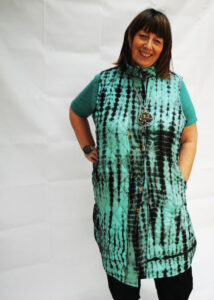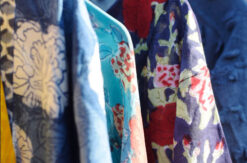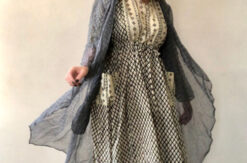Its great to see ethical fashion becoming mainstream with the focus on last night’s Dragon’s Den (29.4.21) being on an ethical fashion checker website. A lovely young couple with brilliant credentials (and about to become parents), were looking for investment in their ethical fashion product verification business. The idea (if we understood it properly) is that consumers could look for a product – say a T shirt, and an algorithm would throw up ethical rating scores for different products and brands. The manufacturers would be the ones that paid for their products to be rated. The entrepreneurs explained it would work like Trust Pilot. However, trust pilot relies on consumer reviews (these are reviews of shops in the fashion sector) and I am not entirely sure how this concept would work for manufacturing businesses. So I was relieved when Touker Suleyman pointed out what appears to be a very real problem. – the thorny issue of verification – asking the couple when was the last time a factory had been visited. Unless the factories and workshops, which are often abroad in the fashion industry, are being continually visited and scored by thousands of checkers, there really is no knowing whether the manufacturing process is ethically sound. The entrepreneurs had never even visited a factory in another country and their experience, which was minimal in terms of verification, was confined to the UK. Touker, who is a highly successful fashion entrepreneur who came to England as a boy (unable to speak a word of English), still liked the investment opportunity – and made an offer. This was rejected in favour of joint investment from eco Dragon Deborah Meaden and Peter Jones – who wanted a much lower share of the company.
From our perspective, Touker was right. When we work with a manufacturer who brands and markets themselves on the basis they are ethical and principled, this has to be on the basis of trust. We are not going to be flying out to India every month to check whether what they say is true. We cannot afford to do this and it would be hugely wasteful. Yes, there are fair trade approval schemes that manufacturers can buy into – but these can be cost prohibitive for smaller companies. It can be a way of governments making money – one that doesn’t work for a small business, cottage industry or start up company. Ultimately too, having a certificate, does not mean that standards are continually being met. Its certainly a hugely positive step – but it doesn’t give a guarantee. Nothing can. Transparency is good thing in manufacturing however, and it was fantastic to see lots of photographs of the workshops and wonderful skilled artisans who make clothing for Nila Rubia – when they sent out their latest look book for Autumn Winter 2021.Many in India have first hand experience of labour exploitation – this being the driving force that motivates them to set up ethical companies. We do know this is the case with some of our manufacturing collaborators.
Exploitation of labour is also just one aspect of the fashion industry that needs addressing. Environmental harm is another – moving away from cotton or synthetics made with dyes that pollute. If it is cotton, which is hard to give up, then at least organic cotton is better for the environment. Sustainable moss crepe and bamboo silk feel wonderful to wear – and hemp and linen are beautiful natural fabrics that offer an alternative to cotton. Nila Rubia are doing their best to promote & pioneer the use of these fabrics (we were really impressed with the moss crepe last year and will be ordering more of this), and Afterlife have made us stunning pieces in hemp and linen, lined with soft organic cotton.
Reducing waste is another way to lessen the environmental impact of the fashion industry. In this context creatively upcycling & tie dying vintage sarees- and making them into gorgeous dresses, jackets, gilets and tunics – that will look stunning on a woman in the West, who would never wear a saree, is a great way to unite women of the world and raise consciousness about the clothes we wear. This is what Cofur do. They are creating beautiful timeless pieces we cannot imagine would ever end up as landfill!
Conscious Apparel are not manufacturers – and our aim is simply to raise consciousness and awareness of ethical fashion by bringing you beautiful clothes that are impossible to resist. Clothes that people will notice you wearing and ask questions about. Clothes you will feel fabulous wearing.
We really hope you enjoy browsing our collections as much as we enjoy putting them together for you – and wearing them ourselves (a huge perk of the business!).
Sylvia and Karin




